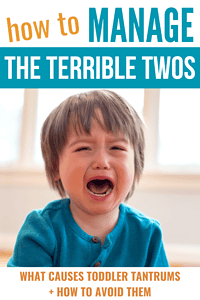This post may contain affiliate links. Meaning I receive a commission for purchases made through those links, at no cost to you. As an Amazon Associate I earn from qualifying purchases. Please read full disclosure here.
Welcome to the terrible twos! Or maybe your little one is having tantrums as an older toddler. Either way… let’s address toddler tantrums AND what to do about them!

Toddler tantrums can be ROUGH. Especially when you are dealing with one in public. Yikes! Know that every parent has been there. Your toddler might be totally fine one minute and in a fit of rage the next. Temper tantrums are a TOTALLY normal part of development.
Hearing your toddler shout things they don’t mean is hurtful. They don’t mean it though. Your child is still learning how to deal with their strong emotions. Dealing with a public tantrum is super challenging and embarrassing. I promise you’re not alone.
You probably want to know what to do about them AND how to avoid them. Let’s break it down.
RELATED: Best Graco Car Seat For Toddlers In 2024 } Top 17
RELATED: 31 Best Bags For Moms With Toddlers In 2024
RELATED: Where To Find The Best Montessori Toys For 1 Year Old Toddlers
What are toddler tantrums?
Toddler tantrums are outbursts that usually occur due to unmet needs or wants. Tantrums are common in younger children because they can’t express themselves or manage their very strong emotions.
Why do tantrums happen?
Temper tantrums occur when children do not get what they want. Children who are still developing their language skills, around 1 to 2 years old, will have tantrums because they are trying to communicate a need and are unable to express themselves. For example, they may want a toy out of reach, more milk, or food. Frustration kicks in when they are not able to communicate OR when you are not responding to their request the way they want you to.
Around age 3 or 4, you probably notice that your little darling has become more autonomous. They know EXACTLY what they want and need. They just want you to cooperate. It’s so tough being a toddler. You may also notice a bit of a power struggle going on at this stage. Remember that at this age, your child is still learning to manage their emotions. Something small can turn into something large. Pretty quickly too!
It is normal for your toddler to value their independence. Do you notice that your child wants to do everything by themself? My toddler has thrown a fit MANY times when she tries to do something herself and needs help. Putting her shoes on, getting onto her booster seat, and completing a puzzle are just a few examples. Can you relate?
Becoming emotionally overwhelmed is typical in toddlers. It is important to remember that your child’s brain is still developing. Their prefrontal cortex is not fully developed.
When do toddler tantrums arise?
You can expect tantrums to arise between 12 to 18 months old. They are most common between ages 2 to 3. Hence the name we are all familiar with- the terrible twos! Take a deep breath though because they should decrease until age 4.
If your child’s tantrums are getting worse after age 4, you may want to see your pediatrician.
What do you do during a tantrum?
Stay Calm
I know that this can be challenging. Especially if your toddler is having a tantrum in public. I have been there! Take a deep breath and calm down. Don’t take this tantrum personally mama. It is definitely developmentally appropriate. Matching your child’s energy will only escalate the situation. After all, as parents, one of our jobs is to model appropriate reactions.
After taking a deep breath, calmly speak to your child. This may sound something like, “I know you are feeling angry right now.” I have had success dealing with tantrums when acknowledging my daughter’s feelings or emotions. They want to be understood.
Ensure Safety
While I totally support acknowledging your child’s feelings and letting them express their emotions, it is ALSO important to ensure that they are safely doing this. Some toddlers might hit or kick during tantrums.
If your child is not being safe you might respond by saying something like, “I know you want to hit, but that is not allowed.”
Distract
Another strategy that works well is distraction, distraction, distraction. Lucky for us (in this situation), children have short attention spans. If my daughter is beginning to throw a tantrum, I will distract her by saying, “Let’s color.” Coloring is such a calming activity and makes for the perfect distraction. Try it.
You can also distract your babe by making a silly face, enthusiastically directing their attention to look at something cool nearby or ask them to help you with something. I don’t know about your toddler, but mine LOVES to help.
Ignore the Behavior
If your toddler is having a tantrum over something like wanting a treat or a household item that they aren’t supposed to have, offer them something more practical.
This looks like, “You can’t have a cupcake right now, but you can have some fruit.”
Tantrums are an attention-seeking behavior. Assuming your child is safely throwing a fit, you can travel to a nearby room of your house. You may discover that your toddler follows you. Once the behavior stops and your child calms down, calmly discuss the situation and offer other solutions.
Don’t Give In
Here is something you should NOT do. Giving in can be tempting sometimes. BUT DON’T DO IT! Giving in only reinforces the behavior. If you give in, you are essentially rewarding the behavior. As a result, you can expect to see a whole lot more of these not-so-pleasant outbursts!
Encourage Self-Soothing Techniques
Toddlers need us to show them how to manage their big emotions. Encourage your toddler to breathe slowly or take deep breaths. Coping skills do not come naturally.
How can you avoid toddler tantrums?
Model Your Expectations
Modeling positive behavior is a must. Kids are sponges. They watch us and model what we do whether our behavior is good or bad. So be very aware of how you react when you are upset. This is where keeping your cool comes in handy.
Avoid Classic Triggers
Ever notice how hunger, fatigue, and overstimulation affect your child? Avoid these triggers at all costs.
I NEVER leave the house without a snack. Ever.
Comfort Your Toddler
Some toddlers might find comfort in getting a hug. However, this is not the case for all toddlers. My daughter does not want to be touched when she is in the middle of a meltdown.
Establish Routines
As a former teacher, I understand how crucial it is for kids of all ages to have a routine established. With routine comes predictability. It makes a HUGE difference when your child can predict what is coming next. This makes transitions easier and will help avoid tantrums.
Before leaving playdates I always warn her when we will be leaving. This sounds like, “We are going home in 10 minutes.”
Other Posts You May Like:
19 Healthy Hiking Snacks For Toddlers


Leave a Reply